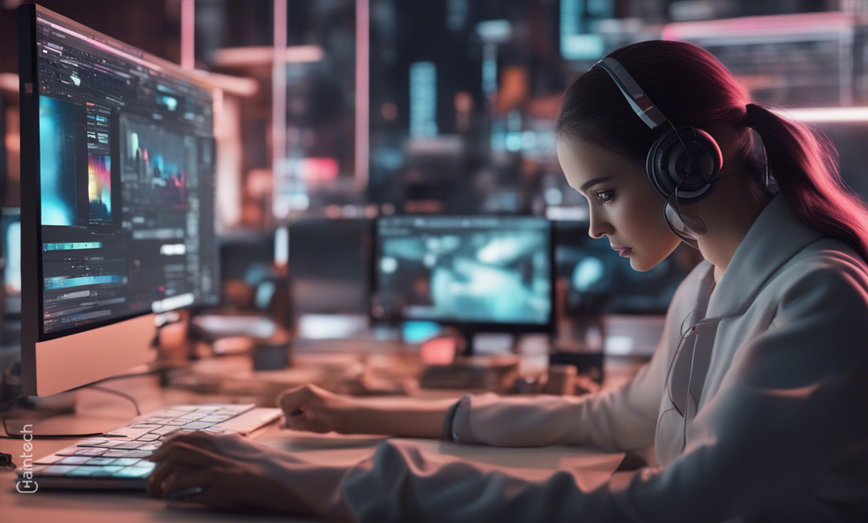Creating Viral Motion Graphics: The Essential Role of After Effects

Introduction
Motion graphics, a powerful visual storytelling tool, have become increasingly influential in the digital era. They combine elements of animation, design, and typography to convey information, evoke emotions, and captivate audiences. At the heart of crafting these captivating visuals lies Adobe After Effects – a versatile software that empowers creators to bring their ideas to life. In this article, we will explore the essential role of After Effects in creating viral motion graphics, diving into its features, techniques, and tips for unlocking its full potential.
Understanding Viral Content
Viral content has the remarkable ability to spread rapidly across online platforms, captivating viewers and generating immense engagement. But what exactly defines viral content? Viral content often possesses certain characteristics, such as evoking strong emotions, being highly shareable, and delivering an unexpected or entertaining experience. When it comes to motion graphics, they play a significant role in crafting viral content. Their ability to convey complex ideas in a visually appealing and concise manner makes them highly shareable and capable of capturing viewers’ attention within seconds. After Effects, with its vast capabilities, becomes an indispensable tool for creating visuals that can potentially go viral.
The Fundamentals of After Effects
Before delving into the creation of motion graphics, it’s essential to understand the basics of After Effects, including its interface and workflow. After Effects presents users with a comprehensive workspace where they can organize their projects efficiently. Its timeline-based system allows for precise control over animations, making it easier to create stunning motion graphics. One key aspect is keyframe animation, where elements can be animated by setting key points at specific intervals, resulting in smooth and dynamic movements. Additionally, After Effects leverages layers and masking techniques to create depth and complexity within visuals, allowing for the seamless integration of various elements.
Enhancing Visual Elements: Effects and Presets
After Effects offers a plethora of effects that can be applied to enhance visual elements and elevate the overall aesthetics of motion graphics. From subtle color adjustments to dramatic distortions, the extensive library of effects empowers creators to customize the visual experience according to their artistic vision. Moreover, After Effects provides the convenience of utilizing presets, saving time and effort by offering pre-defined combinations of effects and settings that can be easily modified and applied to different projects. These effects and presets not only enhance creativity but also contribute to the creation of visually stunning and unique motion graphics.
From Start to Finish: Creating Compelling Storyboards
Storyboarding is an essential step in the creation of motion graphics. It involves sketching out ideas, visualizing concepts, and planning the sequence of scenes. Through storyboarding, creators can map out the flow of their motion graphic and experiment with different compositions. Once the storyboard is finalized, After Effects becomes the medium through which these ideas are translated into stunning visuals. By breaking down the storyboard into individual compositions and scenes, creators can then bring them to life within the After Effects workspace.
Animating Text: Captivating Typography
Typography plays a crucial role in motion graphics, conveying messages, setting the tone, and guiding the viewer’s attention. After Effects offers an array of typography capabilities, enabling creators to experiment with various fonts, styles, and animations. By employing techniques such as text tracking, kinetic typography, and dynamic text animations, creators can make their text elements come to life, delivering captivating narratives through visually appealing and engaging typography.
Mastering Motion: Animating Objects and Illustrations
For motion graphics to truly captivate, it’s essential to animate objects and illustrations with skill and precision. After Effects utilizes keyframe animation, allowing creators to manipulate properties such as position, scale, rotation, and opacity over time, resulting in fluid and dynamic motion. Techniques such as easing, motion paths, and the use of acceleration or deceleration can add an extra layer of finesse to the animations. Moreover, incorporating camera movements within the compositions adds depth and dimension, creating a more immersive experience for the viewer.
Unleashing Creativity: Exploring Shape Layers and Masks
Shape layers in After Effects are a versatile tool that enables creators to generate intricate and customizable graphics. By leveraging shape layers, motion graphics gain flexibility and adaptability, with the ability to transform and animate shapes with ease. Furthermore, masks in After Effects offer sophisticated compositing effects, allowing creators to manipulate specific areas of their compositions discreetly. By blending shape layers and masks creatively, artists can achieve unique visual styles and push the boundaries of their motion graphics.
Seamless Transitions: The Magic of Motion Blur and Time Remapping
Seamless transitions in motion graphics can significantly enhance the visual fluidity and cohesiveness of the overall piece. After Effects offers motion blur effects that simulate the natural blur caused by the motion of objects, adding a sense of realism and smoothness. Time remapping, on the other hand, provides control over the speed and timing of specific segments within the motion graphic. By utilizing motion blur effects and time remapping techniques, creators can create seamless transitions that mesmerize viewers, maintaining their engagement throughout the entire piece.
The Audio Advantage: Syncing Sound and Visuals
Music and sound effects play a vital role in motion graphics, enhancing the overall impact and viewer experience. After Effects allows creators to seamlessly integrate audio into their compositions by synchronizing sound and visuals. By adjusting timing and syncing animations to specific audio cues, creators can create a harmonious blend of sound and motion, evoking the desired emotions and immersing viewers in the narrative.
Advanced Techniques: 3D Animation and Visual Effects
With After Effects, creators can explore advanced techniques such as three-dimensional animation and visual effects, elevating their motion graphics to new heights. By integrating 3D elements into their compositions, artists can add depth and realism to the visual experience. Additionally, After Effects offers a range of visual effects that can be applied to create stunning and otherworldly visuals. These advanced techniques empower creators to push the boundaries of their motion graphics and unlock new creative possibilities.
Rendering and Exporting: Sharing Your Masterpiece
Once the motion graphic masterpiece is complete, it’s essential to render and export it properly to ensure optimal visual quality and compatibility across platforms. Understanding rendering settings within After Effects ensures that the final output maintains the intended quality, balancing file size and performance. Additionally, exporting motion graphics for various platforms and formats requires careful consideration of specifications and settings to ensure compatibility and accessibility for the intended audience. With the proper rendering and exporting techniques, creators can confidently share and showcase their viral motion graphics.
Summary
After Effects serves as a catalyst for unlocking the virality potential of motion graphics. By harnessing the software’s comprehensive tools and techniques, creators can create visually captivating and seamless animations that capture viewers’ attention and deliver memorable experiences. These captivating visuals, combined with carefully synchronized audio and a compelling narrative, inspire creativity and drive audience engagement. Through the power of After Effects, creators can bring their viral motion graphics to life and make an enduring impact in the digital landscape.









